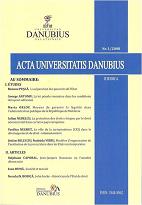LA SÉPARATION DES POUVOIRS DE l’ÉTAT
THE SEPARATION OF POWERS IN STATE
Author(s): Benone PuşcăSubject(s): Law, Constitution, Jurisprudence
Published by: Editura Universitară Danubius
Keywords: principle of separation of powers; legislative power; executive power; judiciary power
Summary/Abstract: The principle of separation of powers appeared in the extent to which it felt the need to establish the constitutional regime. The symbiosis idea of democracy with the principle of separation of powers in state under the representative regime is explained by the fact that some doctrines, at the end of the century XVIII, have finally managed to subordinate the idea of Montesquieu in only one principle, namely, the principle of separation of powers. Moreover, Montesquieu was considered the father of this principle, and he claimed that the representative regime without separation of powers could lead to tyranny. Under the tradition, legislative power is granted to the Parliament. Therefore, the Parliament makes the laws for a long period or even forever, improves or repeals the existing ones. This feature of the Parliament results of both classic doctrine and from some constitutions, such as that of Romania, which in art. 61 (1) shows that the “Parliament is the supreme representative body of the Romanian people and the sole legislative authority of the country”. Under the second power, the executive one, the concept is related to the implementation of laws on individual cases. Executive power has in view the existence of two bodies: The Head of State and the Government, with clear and specific tasks set by the Constitution of Romania. Under the judiciary power, the courts punish crimes and judges litigations between private people.
Journal: Acta Universitatis Danubius. Juridica
- Issue Year: 4/2008
- Issue No: 1
- Page Range: 9-20
- Page Count: 12
- Language: French

